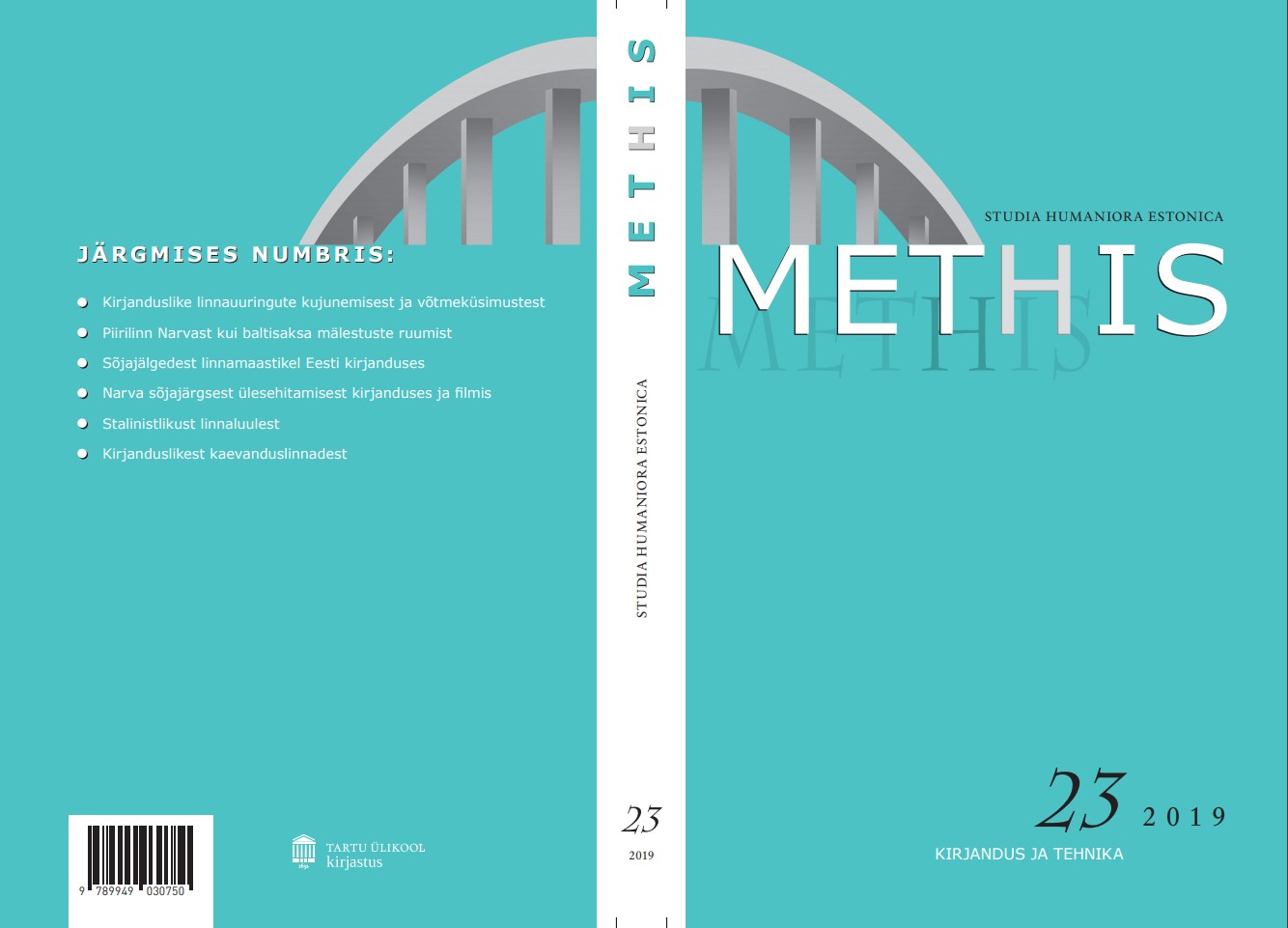Tehnikapööre ja luulekääne: tule jumal appi / A Technical Turn and Poetic Declination: God help us
DOI:
https://doi.org/10.7592/methis.v18i23.14801Keywords:
jumalad, ilmutus, Heidegger, tehnika, kunst, maailmavaade, filosoofia, teoloogia, gods, revelation, technology, art, worldviewAbstract
Manifestilaadne artikkel „Tehnikapööre ja luulekääne: tule jumal appi“ kuulutab uute jumalate kohalesaabumist autori isiklike kogemuste varal. Kogunenud teadmisi ja aimdusi tõlgendatakse Heideggeri-järgses mõtiskluses, mis ühelt poolt lähtub filosoofi post-metafüüsilisest luulekesksest süsteemist, teisalt aga kasvab sellest kriitiliselt üle.
“A Technical Turn and Poetic Declination: God help us” is a post-Heideggerian contemplation with a touch of personal manifest[ation]. It takes his post-metaphysical poetry-driven system as its point of departure for a free, idiosyncratic interpretation, yet simultaneously critically challenges it. Graphically, Heidegger’s theoretical vision – not so self-evident in the whole heideggeriana – is depicted as a four-step decline of epochs of subsequent worldviews: mythological, religious, humanistic (i.e., modern), and technological (post-modern). The important question is: What comes next? Heidegger assumes that the post-technological era (in a sense, post-post-modernism) must involve some return of the gods in a vague fading form; however, he does not yet recognize its arrival. He has not personally experienced it, he only speculates and hopes for the best.
Five theses are postulated upon this concept. First, technological supremacy should not be demonized since a new worldview might emerge from the inner way technology surfaces. Second, art should not deny the technological manner of revelation, given its importance. Third, Heidegger’s speculation about a new god who will manifest itself in a hint could not originate from his actual encounter with god. Fourth, he speaks of a possible turn within the technology-induced world yet still hopes to restore the ancient quadrangle of mortals, immortals, earth, and sky, which does not represent any transcending change. Five, new gods can grow out of human beings themselves, being very close to them. This can stem from a reflective feedback mechanism, a morally grounded mirroring power human beings possess. Epiphanic happenings originate from human minds and deeds but return to them from the outside and, thus, can’t be deliberately created and controlled. Subsequently, individual insights can merge to unite larger groups into social patterns: a new, fully scientific religion can emerge.
A marvelous example to consider is recorded in the documentary about recently deceased Catholic priest Vello Salo: Vello Salo. Igapäevaelu müstika. Film vanaks saamise ilust (Vello Salo: The Mystery of Everyday Life: A Film on the Beauty of Ageing, 2018). Director Jaan Tootsen manages to address one instance of divine feedback, which may provide unique value to theology and phenomenological philosophy. At the request of a sister of the Pirita Convent, Salo screwed a portable sculpture of Christ onto a wooden cross. Although the priest saw that he had failed to turn the screw in fully, he was certain it would hold. Nevertheless, in the middle of mass, the statue of Christ jumped to the floor right in front of the congregation and Salo among them. The psychological origin of this event can be sought from his internal conflict. The film depicts a grumpy old man on the verge of death who actively protests being old and insults everyone around him; and yet, it represents the act of a servant of God who has preached the salvation of heaven his whole life to feel more at peace with death’s approach. This moral dilemma resulted in a disgraceful “punishment,” attributable not to some God in the clouds, but rather traceably to Salo himself: he chastises himself through this instructive, albeit impersonally mediated act. This event was based entirely on himself, his pre- or unconsciousness, yet was not consciously actualized. This was an objectified moral reflection from an external environment. We can admit, however, that Father Salo was a happy person, who, by the end of his life, had managed to become the humble “donkey of Christ” he had always dreamed of being. This, then, proves to be an unprecedented, representative, and theological tool of study.
These kinds of reflective events have long interested the author of this article, having experienced them several times in his own conscious life. It is important to note, however, that one should not paranoically interpret or project non-existent meanings. Even if moral punishment seems to be the influence behind these cases, their broader meaning remains favorable to human beings in that they act as divine precautions. It is possible, then, to be a convinced atheist, but still acknowledge the phenomenon, which ancient people frequently had reason to call divine. Such divinity is very close to man, originating directly from within himself, not from an abstract and hypostatic distance. The new gods that Heidegger still has not met are apparently just so: coming together, step-by-step, and not escaping from us.


